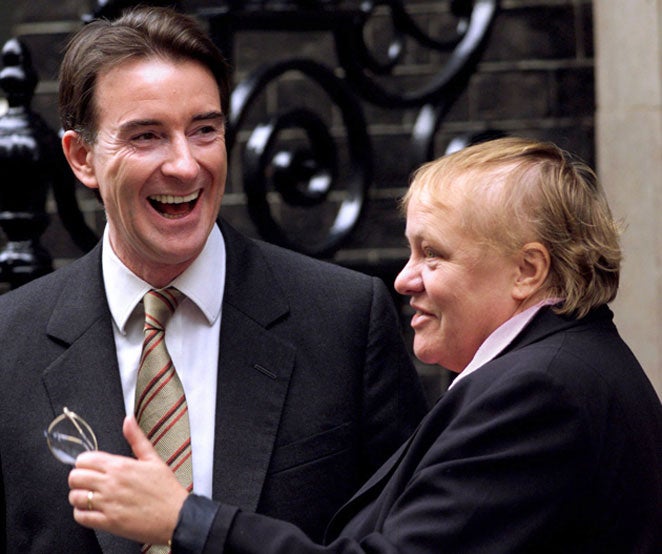The Weekend's Television: Mo, Sun, Channel 4<br/>The Virtual Revolution, Sat, BBC2
Right in the thick of it

Mo began by unveiling a kind of stained-glass window dedicated to the memory of the people's politician – a montage of exemplary scenes that presented its subject as caring (Mo in a community centre, cheering a Down's syndrome girl as she sings a karaoke version of "Wonderwall"), passionate ("If that boiler isn't fixed today," she yells as she tries to solve a problem for a constituent, "I'll have it taken out and shoved up your arse") and winningly committed to the pleasures of the flesh ("God, I need a fuck," she groans to her husband, as she cradles a glass of wine in her free hand).
This is a modern sainthood, not the repudiation of human appetite but its guiltless, candid celebration.
If Neil McKay's drama about Mo Mowlam had continued in the same reverent vein all the way through it would have been a very dull affair, however true it might have been to the essential lovability of its subject. Fortunately, it got a bit more complicated than that, though not before exploring some other elements of the standard hagiography. You don't actually have to be martyred to achieve canonisation, but it helps, and after Mowlam was diagnosed with a malignant brain tumour she found herself embarked on a familiar test of the spirit, one that repeatedly lures people into erratic moral judgements about "courage" and "resilience". Here, too, Mo matched the template of the conventional cancer drama, in which what we want to see is a noble fight between good and evil. She even gets mocked by Pharisees, after catty tabloid journalists snipe at the wig and weight gain that follow her radiotherapy.
Fighting well, of course, meant lying to her colleagues about the gravity of her circumstances. "Darling, honestly... it's treatable... totally benign," we hear her telling Tony Blair, shortly after her consultant has insisted that she come clean. And without that half-truth it's very unlikely that she would have got the job as Secretary of State for Northern Ireland. Which naturally raises the question of whether Northern Ireland would have got peace as soon as it did if she hadn't got the job. And it was here that McKay's drama resisted the obvious temptation – to make Mo into the betrayed architect of the Good Friday Agreement – and went somewhere a little more intriguing. Mo's raucous, vulgar informality sometimes jolts the participants into movement: "I tell you what boys," she tells Gerry Adams and Martin McGuinness after their first encounter starts badly, "let's start this meeting again, only this time no cocks on the table." But it's also clear that it's a serious sticking point for the Unionists. Her courage in visiting the Maze prison to coax Loyalists into line is acknowledged, but also the usefulness – for the self-regard of all those hard men – of having a woman over whose head they could go. And though those closest to Mo insist that she has it in her to be prime minister, the drama itself is much more clear-eyed about that prospect and Mowlam's own bitterness about the end of her career.
Julie Walters – no novice when it comes to playing the terminally ill – was predictably excellent in the role. What you couldn't have foreseen as easily was the clinical honesty with which the film ended. There was a terrific scene where it dawns on Mowlam that the personality she always thought she was protecting against her cancer may actually have been a product of it, a classic symptom of "disinhibition". It would be a vertiginous thought, this – that your essential charm is no more than pathology – and Walters played the moment beautifully, following up with some painful scenes that acknowledged that the cancer went on to dismantle that charm quite ruthlessly. It ended, quite properly, with affection and regret, for a personality that just wasn't there anymore.
The Virtual Revolution, a four-part series about the transforming effects of the internet, is both premature and overdue. Premature because when you're in the middle of a forest fire you can have no sensible idea of how it will eventually burn out. Overdue, because the flames have been raging for 15 years now and it's excellent that the BBC is at last sticking a dampened finger in the air to see which direction the wind is blowing. Aleks Krotoski makes a fine presenter and they've got the all the big names – from Steve Wozniak, Bill Gates and Jimmy Wales of Wikipedia to the man who lit the match, Sir Tim Berners-Lee. He was the subject of brief hagiography here too, elegantly phrased by Stephen Fry, who also pertinently reminded us that we really should be excited about living through one of the great intellectual revolutions of human history. I'm glad to say there's room for the odd sceptic too, and for the odd moment of bathos. Take a bow Harrogate, which, according to the research conducted for this programme, is Britain's capital of online porn consumption.
t.sutcliffe@independent.co.uk
Join our commenting forum
Join thought-provoking conversations, follow other Independent readers and see their replies
Comments
Bookmark popover
Removed from bookmarks